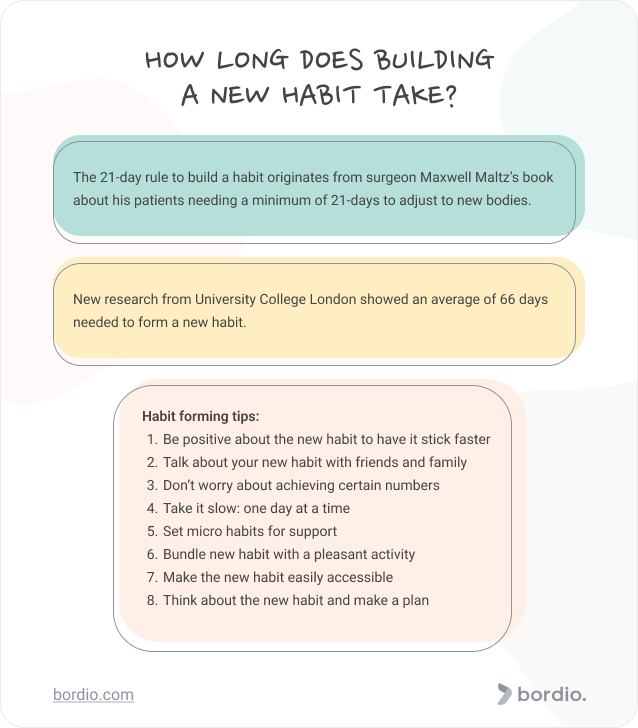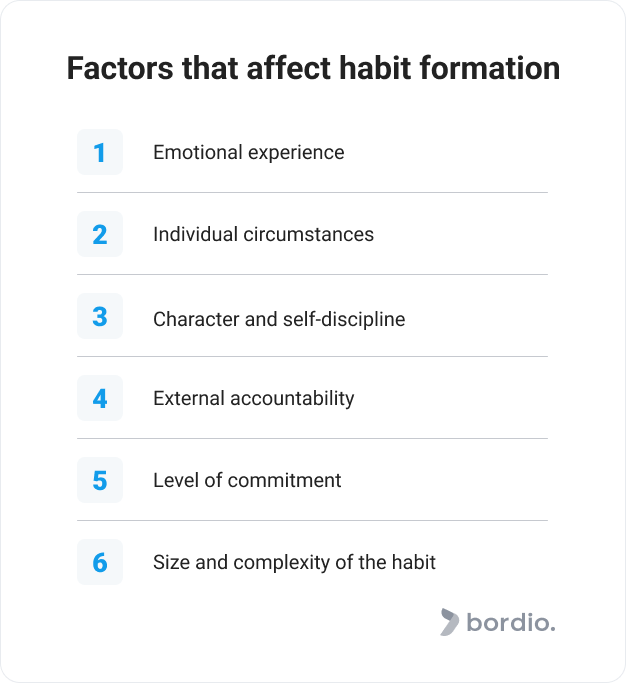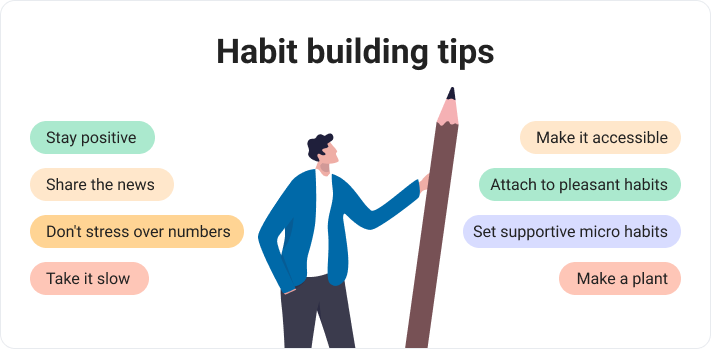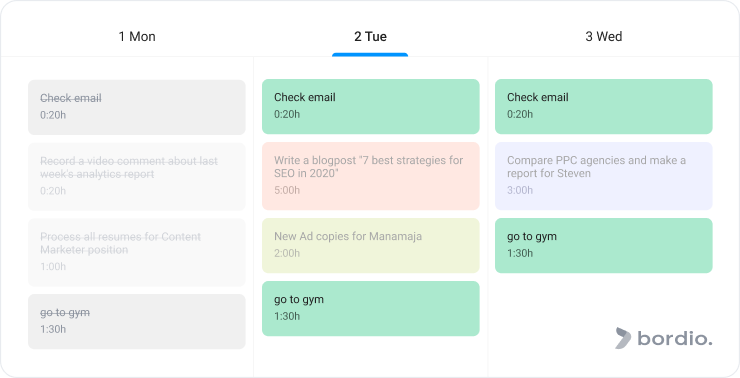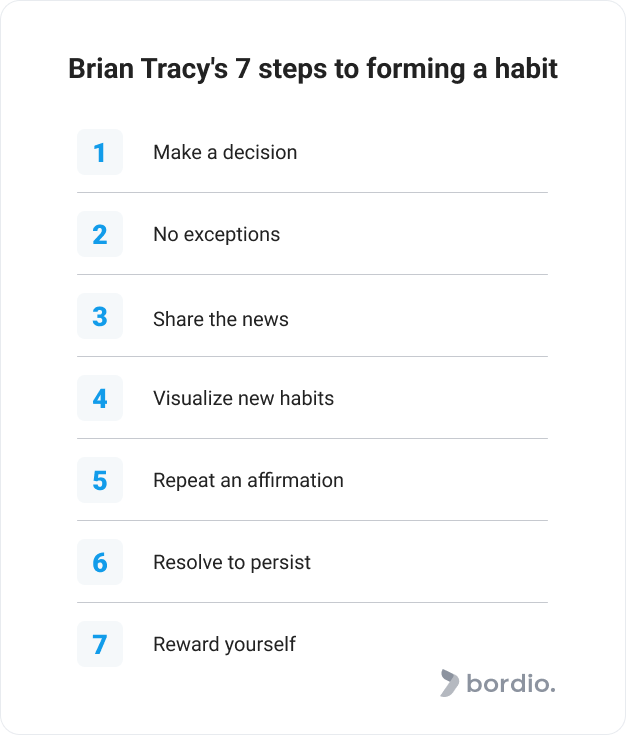Habits are an integral part of human beings. And it’s the automatic habits, such as brushing our teeth in the morning, that shape our routines and, inevitably, our lives.
Since the beginning of time, people were looking for ways to improve themselves, with a big focus on changing their habits. Naturally, habit formation became a science of some sort with countless beliefs, ideologies, and techniques shaping around it.
And when it comes to building habits, certain ideas are ingrained in our minds, such as that one should take 10 000 steps a day, or that it takes 21 days to form a habit. But are those notions true? Let’s find out together!
Where does the 21-day rule come from and is it realistic?
James Clear, the author of Atomic Habits best seller, debunks the myth by explaining where it came from.
Apparently, surgeon Maxwell Maltz has written a book in which he shared that, based on his observation, patients needed a minimum of 21 days to adjust to their changed bodies. See where it all went wrong? Society has quickly picked this idea up, dropped the “minimum” and took it from there.
So, if you’ve tried to form a new habit, such as healthy eating, over a 3-week period and failed, don’t worry! It’s not necessarily your fault.
There was interesting research conducted in 2009 by a University College London researcher, in which they found out that it took the experiment participants from 18 to 254 days to form a new habit with an average number being 66 days. So, if you’ve not mastered the new habit by the end of day 21 – just keep on going until this new behavior becomes a natural part of your life.
As we see, it is possible to form a habit in a 21-day period, but it’s not a rule. After all – the power of self-persuasion is so strong that if we deeply believe that we can stick to a habit in 3 weeks, then we’re more likely to achieve that! Kind of like when you have a cold and take a placebo, and feel better after it.
Some new behaviors will stick to you quicker, some could take months before they feel natural to your routine. So, don’t get discouraged by numbers, and keep on going until you succeed!
What does forming a new habit depend on?
The length it takes to form a habit depends on many factors, including:
- Significant emotional experience. For example, if the doctor tells us we must quit eating junk food because we’re one step away from diabetes, we’re more likely to stick to a certain diet quickly.
- Circumstances. No matter how much you want to study French three times a week, if you are a project manager with a long list of responsibilities and currently manage multiple projects all with approaching deadlines, form a new habit will take you longer. Or maybe you won’t be able to form it at all! Before starting something new, have an honest look at your life and your weekly planner – do you have time for that without sacrificing sleep and relationships? There is a lot of truth in the saying: “To start a new thing you have to give up an already existing one”.
- Individual character and self-discipline. Anyone can become disciplined and learn persistence. However, some people will be closer or farther away from the required skillset. It’s not good or bad, but it has to be factored in. To be self-disciplined for your own good you should use an accurate schedule planner to guide you.
- External accountability. Many people that were in quarantine during the pandemic have found that it’s much harder to stick to good routines when nobody sees you.
- Level of commitment. It can vary, especially if someone wants to build a habit as a response to external stimulation, such as your favorite blogger looking good in their Reels videos about boxing classes. If you’re not sufficiently motivated, get ready for a long ride.
- The size and complexity of the habit. If you target running half-marathon distances every weekend, you will definitely need more than 21 days to prepare yourself!
Tips to build a new habit
As we go through our lives, we are constantly looking for ways to adapt positive habits and stay motivated to stick to them over the course of many years. Habit change is not always easy, but there are tips that will make it easier for you.
Be positive about it
If you want to build new habits and have them stick, approach them from a place of positivity. For example, working out in the gym after work 3 times a week is not yet another tiring to-do in your online calendar planner, but an excellent opportunity to become stronger and healthier. Not everyone gets a chance to do it, so you are very lucky.
It’s easier and faster to adopt something that we are actually excited about. As you continue forming habits, take care of yourself, and don’t beat yourself up if something doesn’t go according to plan. It is a process, ups and downs are inevitable.
Your mental health should always be a priority over any new behaviors that you desire to include in your lifestyle.
Talk about it
Some people benefit from sharing the news with friends or family and feeling more accountable like that. You can go down that route, or choose to work with a professional coach. Working with a professional can feel intimidating at first, but they can share invaluable advice from their experience, plus there’s no emotional baggage associated with them, unlike your close ones.
Don’t stress too much about numerical achievements
For example, if you are an aspiring author who wants to write every day, don’t set yourself a target of writing 3 000 words daily. Instead, allocate 30 minutes for this task in your digital day planner and simply start writing every day. Using simple task planner you will always be able to see your progress. Once you’ve mastered the habit, you can make it more challenging by adding numerical goals.
Take it one day at a time
It’s important not to push yourself too hard right from the beginning. After all, you want the habit to become a part of your daily life, not daily torture. You can’t become a pro at Agile or Scrum project management in a week, it’s unrealistic. So focus on incremental progress, and you will get there. Slow and steady wins the race, remember?
Set micro habits for support
To succeed with new habits, it would help if you set yourself up for success.
For example, set micro habits to support your main habit. Let’s say you want to go to bed earlier and have a better sleep quality. To achieve that, start putting your phone as far away from your bed as possible, and place a book on the bed table.
That way, you won’t be able to reach for your phone easily with its disturbing blue light and indulge in the bad habit of scrolling the flashy Tik Tok videos but will grab a book instead. And chances are, reading will make you sleepy much faster, resulting in you falling asleep earlier than usual.
Bundle it up with something nice
If you are trying to form a habit that’s not as pleasant and easygoing, such as running every day, bundle it up with something pleasant.
For example, let running be the time when you get to listen to books or your favorite podcasts. Even better, if you are running on a treadmill, turn on your guilty pleasure show and enjoy it while building a healthy habit. We love a win-win!
Bundle it with an existing habit
Another tactic is to attach new habits to already existing ones.
For example, if you want to do exercises in the morning, attach it to the habit of brushing your teeth. Make it a rule that after you clean your teeth, you always go and do exercises.
It’s all about creating a behavioral pattern, and this trick helps because it’s easy to start a new habit if it’s tied to something deeply ingrained into our routine. You’ll have a specific time for when your new habit has to be practiced, and you’ll be automatically positively triggered. Pretty much like a Pavlov’s dog.
Make it accessible
Help yourself a little bit by making the new habit more accessible.
For example, if you want to start eating fruits every morning, make sure you place them in the center of the kitchen table or at your desk. Or, if you are trying to quit smoking (which we applaud if you do), take a nicotine patch with you anywhere you go to have an easy solution for temptations.
Think about it and make a plan
When adopting a new behavior, sit down and think about when and where you’re going to do it. Use schedule maker weekly.
Use Bordio’s digital to-do list to set recurring events or tasks to support your habit formation. Regular reminders will hold you accountable and help you power through the tough period when you don’t feel like exercising the new habit. You can have those repeating tasks in a different color so that you can differentiate them from your work and other commitments.
It’s too easy to just say out loud: I will be exercising and get in the best shape of my life. But then what? According to gym statistics, then follows a few weeks of hard work that is abrupted in a couple of months and never resumed again. Sounds familiar?
As opposed to that sad scenario above, when you have a plan and develop strategies, it increases the chance that you will have new habits formed.
7 steps to form a habit, according to Brian Tracy
Brian Tracy is widely known and celebrated for his best-selling books, such as Eat The Frog, and top sales training. Brian has built a successful career helping people become better versions of themselves, so we thought it is only fitting to include his 7-step system for building a habit.
By the way, we’ve created 2 lists with best productivity books and top time management books. Check them out and pick yourself a copy. All of them contain great advice that will help with your habit formation journey.
Step 1: Make a decision
It all starts with making a decision, or rather an agreement with yourself that from today on you will act (or stop acting) a certain way. For example, you will not be drinking coffee every morning or will switch to a healthy diet five days a week.
Step 2: Make no exceptions
During the habit-forming period, fight the temptation to make an exception.
You can think that skipping one day in the gym or indulging in the strong desire to eat a piece of chocolate cake is not that big of a deal, but it is. Until the habit has become a part of your DNA, it is very dangerous to allow yourself to relax and not stay true to your intentions.
Breaking bad habits and forming good ones is real work. And with every exception you make, you push yourself further from the desired result.
Step 3: Share the news
Tell your friends, family, or co-workers about the new habit you’re looking to adopt. Your accountability and discipline will skyrocket once you’ll know that others are watching you.
Step 4: Visualize yourself with the new habit
Visualization is a powerful tool you can use to build new habits, change current habits, and achieve your goals. Behavior change requires more resources and energy than we often tend to think. Self-improvement tricks like visualization give you an extra boost and push to stay on track.
Imagine yourself already working out 5 days a week and being toned up and energetic. Makes you smile, right? Now make it happen in real life.
Step 5: Create and repeat an affirmation to shorten the timeframe of new habit formation
For example, “I will study German every day for 45 minutes” and you track it in your . As you continue to repeat this affirmation over and over again, it will eventually become part of your subconsciousness. And of course you need to free up time in your time management software for this.
Same with a bad habit. But try using positive phrasing. For example, not “I will not eat cookies because they are bad for me”, but rather something along those lines: “I will stick to healthy, nutritious snacks because they make me feel good inside and out”.
Tip: Set an event or a task in Bordio time planner online and configure notifications to pop up when you most need them. Let’s say you want to work out every day after work. Have Bordio notification set up for 15 minutes before you’re supposed to leave work and go to the gym. Chances are, it will pop up just as you will be considering skipping the class tonight, and it will turn your mindset around.
Step 6: Resolve to persist
Decide for yourself that you will be persistent until the new habit is automatic.
Because until your new habit becomes second nature, you are at risk of going backward. If you have successfully been eating more vegetables for 21 days, don’t stop there if it’s still not a 100% routine! Make sure you continue until you can’t imagine your day without it.
Step 7: Reward yourself
Celebrate your wins along the way to boost motivation and help you stay on track.
As we work on forming the habits, we often associate it with something negative or difficult, like saying “No” to your favorite desserts or having to power through the exercise classes.
It is much healthier and less stressful if we connect new habits with something positive. That’s why rewarding yourself for small achievements is a great instrument in the habit-building process.
Be careful with rewards though. If your goal is to be more productive, then don’t reward yourself with watching 4 hours of Netflix in a row. Instead, treat yourself to a walk in a park and a long delicious lunch. Alternatively, check out our productivity tips digest and get inspired!
Toxic rewards might be pleasant at the moment, but they will make you feel less accomplished and set you farther from your goals.
Final thoughts on building new habits
Just because the 21-day rule is debunked, you shouldn’t be demotivated and resort to long and slow habit adaptation.
There are examples of people changing their lives and forming their habits in relatively short time frames, so instead of settling for the average modeling habit formation of 66 days, why don’t we challenge ourselves? After all, if some people can adapt habits faster, there is no reason why we can’t repeat their success! And speaking of examples, we did a separate article with good habit examples to get you inspired to change for the better. Make sure to check it out, but also stay true to yourself and don’t try to pick up new habits for the wrong reasons.
And if the new behavior turns out to take you longer, simply push forward until you reach the finish line. Not every success can (and needs to) happen overnight.
As long as the habit aligns with your personal values, you’ll get there. Good luck!

